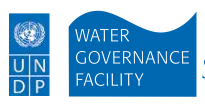The UN Development Programme's (UNDP) Water Governance Facility (WGF) at the Stockholm International Water Institute (SIWI) published three reports, titled: 'Transboundary Water Management;' a 'User's Guide on Assessing Water Governance;' and 'Learning from Experience: Conclusions from a Knowledge Management Initiative.'
 August 2013: The UN Development Programme’s (UNDP) Water Governance Facility (WGF) at the Stockholm International Water Institute (SIWI) published three reports, titled: ‘Transboundary Water Management;’ a ‘User’s Guide on Assessing Water Governance;’ and ‘Learning from Experience: Conclusions from a Knowledge Management Initiative.’
August 2013: The UN Development Programme’s (UNDP) Water Governance Facility (WGF) at the Stockholm International Water Institute (SIWI) published three reports, titled: ‘Transboundary Water Management;’ a ‘User’s Guide on Assessing Water Governance;’ and ‘Learning from Experience: Conclusions from a Knowledge Management Initiative.’
‘Transboundary Water Management: Why it is Important and Why it Needs to be Developed’ describes transboundary water management challenges and recommends development partners support cooperation processes and best practices to achieve cooperative transboundary water management.
The User’s Guide includes chapters on the why, what and how of water governance assessments: the importance of conducting assessments; an assessment framework; an eight-step assessment process; institutions and stakeholder assessments; governance assessments, including accountability, corruption, participation and transparency; and performance assessments, including effectiveness, efficiency and functions. It summarizes existing tools and presents case studies. The Guide aims to help users: understand policy implications of assessments; select, adapt and develop assessment frameworks; design multistakeholder approaches that strengthen accountability, support consensus and further dialogue; and implement assessments to drive reform.
‘Learning from Experience’ includes sections on: knowledge management for water and sanitation governance; the Millennium Development Goals Achievement Fund (MDG-F); local water management; overcoming sociocultural barriers at local, regional and national levels; gender equity and women’s leadership; and strengthening the capacities of duty-bearers and rights-holders. It documents and analyzes lessons learned from 11 Joint Programmes on Democratic Economic Governance and Water Supply and Sanitation, with the aim of strengthening the knowledge base for water, sanitation and hygiene (WASH) beyond the MDG-F. [Publication: Transboundary Water Management: Why it is Important and Why it Needs to be Developed] [Publication: User’s Guide on Assessing Water Governance] [Publication: Learning from Experience: Conclusions from a Knowledge Management Initiative]